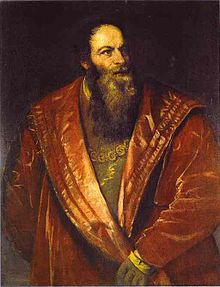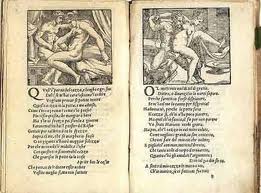Sonetti lussuriosi (Lustful Sonnets): Difference between revisions
m (1 revision) |
No edit summary |
||
| (5 intermediate revisions by the same user not shown) | |||
| Line 1: | Line 1: | ||
====Date: [[:Category: | ====Date: [[:Category:1527|1527]] [[:Category:1558|1558]]==== | ||
====Region: [[:Category:Europe|Europe]]==== | |||
====Subject: [[:Category:Explicit Sexuality|Explicit Sexuality]]==== | |||
====Medium: [[:Category:Literature|Literature]]==== | |||
====Medium: [[:Category:Literature|Literature | |||
---- | ---- | ||
[[File:Aretino2.JPG|left]] | |||
'''Artist:''' Pietro Aretino (1492 - 1556) | |||
'''Confronting Bodies:''' Roman Catholic Church authorities | |||
'''Confronting Bodies:''' Catholic | |||
'''Date of Action:''' 1527, 1558 | |||
'''Location:''' Rome, Italy | '''Location:''' Rome, Italy | ||
'''Description of Artwork:''' Aretino is known for his lewdness and satire. The ''Sonetti lussuriosi'' (Lustful Sonnets) (1524) was written to accompany pornographic engravings by Marcantonio Raimondi, called "posizioni", or positions of sexual intercourse. <P> | |||
[[File:Aretino3.jpg|right]] | |||
'''Description of Artwork:''' Aretino is known for his lewdness and satire. The | '''The Incident:''' Pope Clement VII banned the ''Sonetti'' in 1527. Aretino's succeeding pornographic works were also forbidden by the church. His writing was considered dangerous because of its unashamed celebration of sexuality in its many forms and Aretino's "refusal to restrict his audience to men of virtue." In 1558, ''Sonetti lussuriosi'' went on the Vatican's first index of forbidden books.<P> | ||
'''The Incident:''' Pope Clement VII banned the | |||
'''Results of Incident:''' In Venice, book printers were allowed to print 50 copies of Aretino's works each year, despite the ban. Translations circulated in Dutch, English, French, Spanish and Latin. European writers referenced his work throughout the century. <P> | '''Results of Incident:''' In Venice, book printers were allowed to print 50 copies of Aretino's works each year, despite the ban. Translations circulated in Dutch, English, French, Spanish and Latin. European writers referenced his work throughout the century. <P> | ||
'''Source:''' Censorship, A World Encyclopedia, ed. D. Jones | '''Source:''' Censorship, A World Encyclopedia, ed. D. Jones | ||
[[Category:1527]] | |||
[[Category:1558]] | |||
[[Category: | [[Category:1520s]] | ||
[[Category:]] | [[Category:1550s]] | ||
[[Category:]] | [[Category:16th century]] | ||
[[Category:Europe]] | [[Category:Europe]] | ||
[[Category:Explicit Sexuality]] | [[Category:Explicit Sexuality]] | ||
[[Category:Literature]] | [[Category:Literature]] | ||
[[Category:Pietro Aretino]] | [[Category:Pietro Aretino]] | ||
{{DISPLAYTITLE:<span style="font-style: italic;">Sonetti lussuriosi (Lustful Sonnets)</span>}} | |||
__NOTOC__ | __NOTOC__ | ||
Latest revision as of 16:04, 7 January 2012
Date: 1527 1558
Region: Europe
Subject: Explicit Sexuality
Medium: Literature
Artist: Pietro Aretino (1492 - 1556)
Confronting Bodies: Roman Catholic Church authorities
Date of Action: 1527, 1558
Location: Rome, Italy
Description of Artwork: Aretino is known for his lewdness and satire. The Sonetti lussuriosi (Lustful Sonnets) (1524) was written to accompany pornographic engravings by Marcantonio Raimondi, called "posizioni", or positions of sexual intercourse.
The Incident: Pope Clement VII banned the Sonetti in 1527. Aretino's succeeding pornographic works were also forbidden by the church. His writing was considered dangerous because of its unashamed celebration of sexuality in its many forms and Aretino's "refusal to restrict his audience to men of virtue." In 1558, Sonetti lussuriosi went on the Vatican's first index of forbidden books.
Results of Incident: In Venice, book printers were allowed to print 50 copies of Aretino's works each year, despite the ban. Translations circulated in Dutch, English, French, Spanish and Latin. European writers referenced his work throughout the century.
Source: Censorship, A World Encyclopedia, ed. D. Jones

